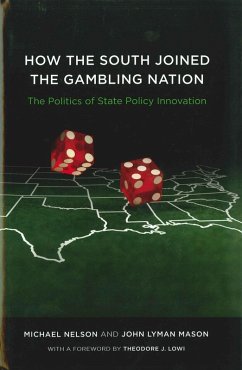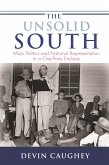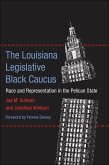A national map of legalized gambling from 1963 would show one state, Nevada, with casino gambling and no states with lotteries. Today's map shows eleven commercial casino states, most of them along the Mississippi River, forty-two states with state-owned lotteries, and racetrack betting, slot-machine parlors, charitable bingo, and Native American gambling halls flourishing throughout the nation. For the past twenty years, the South has wrestled with gambling issues. In How the South Joined the Gambling Nation, Michael Nelson and John Lyman Mason examine how modern southern state governments have decided whether to adopt or prohibit casinos and lotteries. Nelson and Mason point out that although the South participated fully in past gambling eras, it is the last region to join the modern movement embracing legalized gambling. Despite the prevalence of wistful, romantic images of gambling on southern riverboats, the politically and religiously conservative ideology of the modern South makes it difficult for states to toss their chips into the pot.
The authors tell the story of the arrival or rejection of legalized gambling in seven southern states -- Mississippi, Louisiana, Tennessee, South Carolina, Georgia, Arkansas, and Alabama. The authors suggest that some states chose to legalize gambling based on the examples of other nearby states, as when Mississippi casinos spurred casino legalization in Louisiana and the Georgia lottery inspired lottery campaigns in neighboring South Carolina, Alabama, and Tennessee. Also important was the influence of Democratic policy entrepreneurs, such as Zell Miller in Georgia, Don Siegelman in Alabama, and Edwin Edwards in Louisiana, who wanted to sell the idea of gambling in order to sell themselves to voters. At the same time, each state had its own idiosyncrasies, such as certain provisions of their state constitutions weighing heavily as a factor.
Nelson and Mason show that the story of gambling's spread in the South exemplifies the process of state policy innovation. In exploring how southern states have weighed the moral and economic risk of legalizing gambling, especially the political controversies that surround these discussions, Nelson and Mason employ a suspenseful, fast-paced narrative that echoes the oftentimes hurried decisions made by state legislators. Although each of these seven states fought a unique battle over gambling, taken together, these case studies help tell the larger story of how the South -- sometimes reluctantly, sometimes enthusiastically -- decided to join the gambling nation.
The authors tell the story of the arrival or rejection of legalized gambling in seven southern states -- Mississippi, Louisiana, Tennessee, South Carolina, Georgia, Arkansas, and Alabama. The authors suggest that some states chose to legalize gambling based on the examples of other nearby states, as when Mississippi casinos spurred casino legalization in Louisiana and the Georgia lottery inspired lottery campaigns in neighboring South Carolina, Alabama, and Tennessee. Also important was the influence of Democratic policy entrepreneurs, such as Zell Miller in Georgia, Don Siegelman in Alabama, and Edwin Edwards in Louisiana, who wanted to sell the idea of gambling in order to sell themselves to voters. At the same time, each state had its own idiosyncrasies, such as certain provisions of their state constitutions weighing heavily as a factor.
Nelson and Mason show that the story of gambling's spread in the South exemplifies the process of state policy innovation. In exploring how southern states have weighed the moral and economic risk of legalizing gambling, especially the political controversies that surround these discussions, Nelson and Mason employ a suspenseful, fast-paced narrative that echoes the oftentimes hurried decisions made by state legislators. Although each of these seven states fought a unique battle over gambling, taken together, these case studies help tell the larger story of how the South -- sometimes reluctantly, sometimes enthusiastically -- decided to join the gambling nation.
Dieser Download kann aus rechtlichen Gründen nur mit Rechnungsadresse in A, D ausgeliefert werden.









